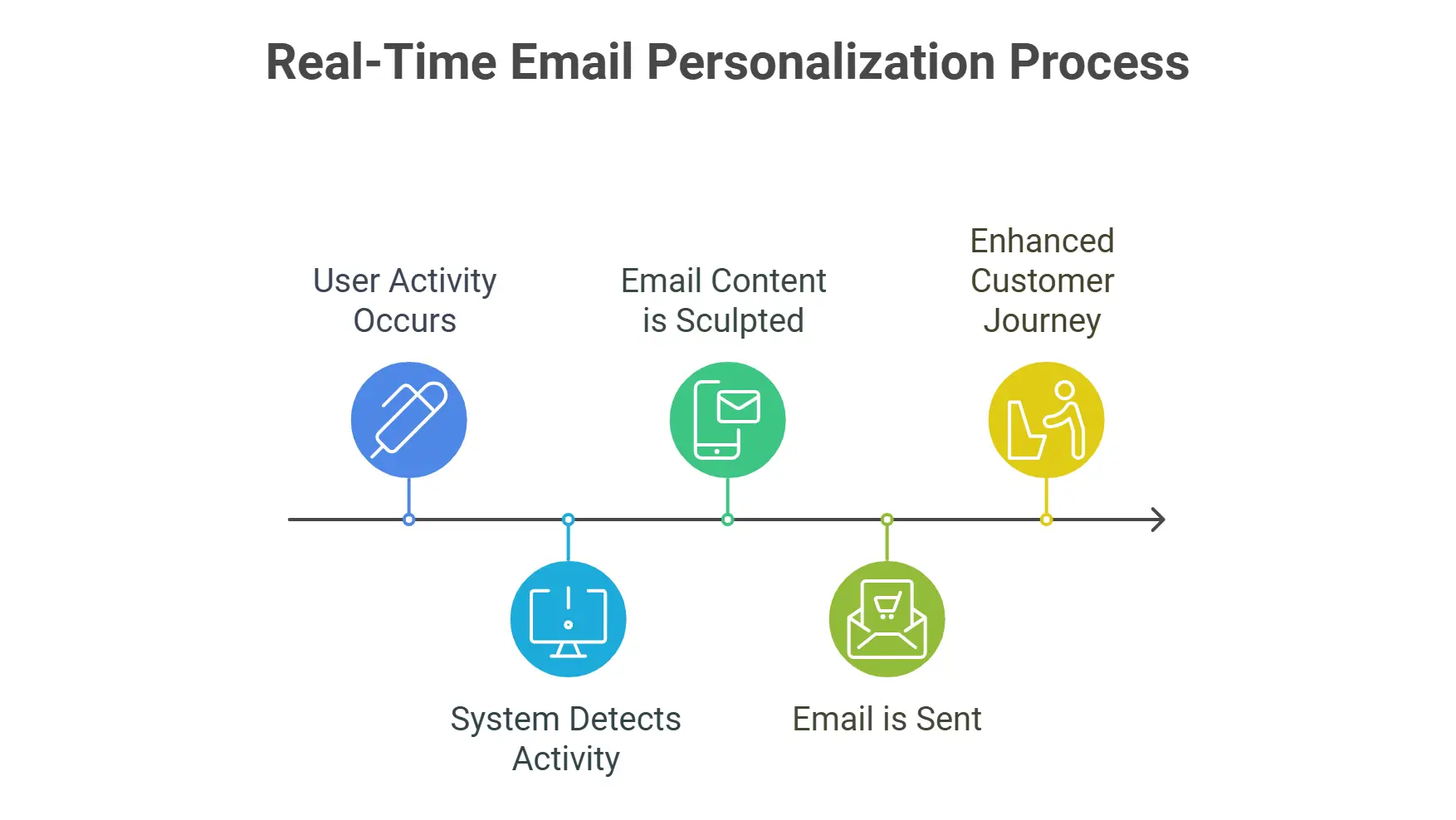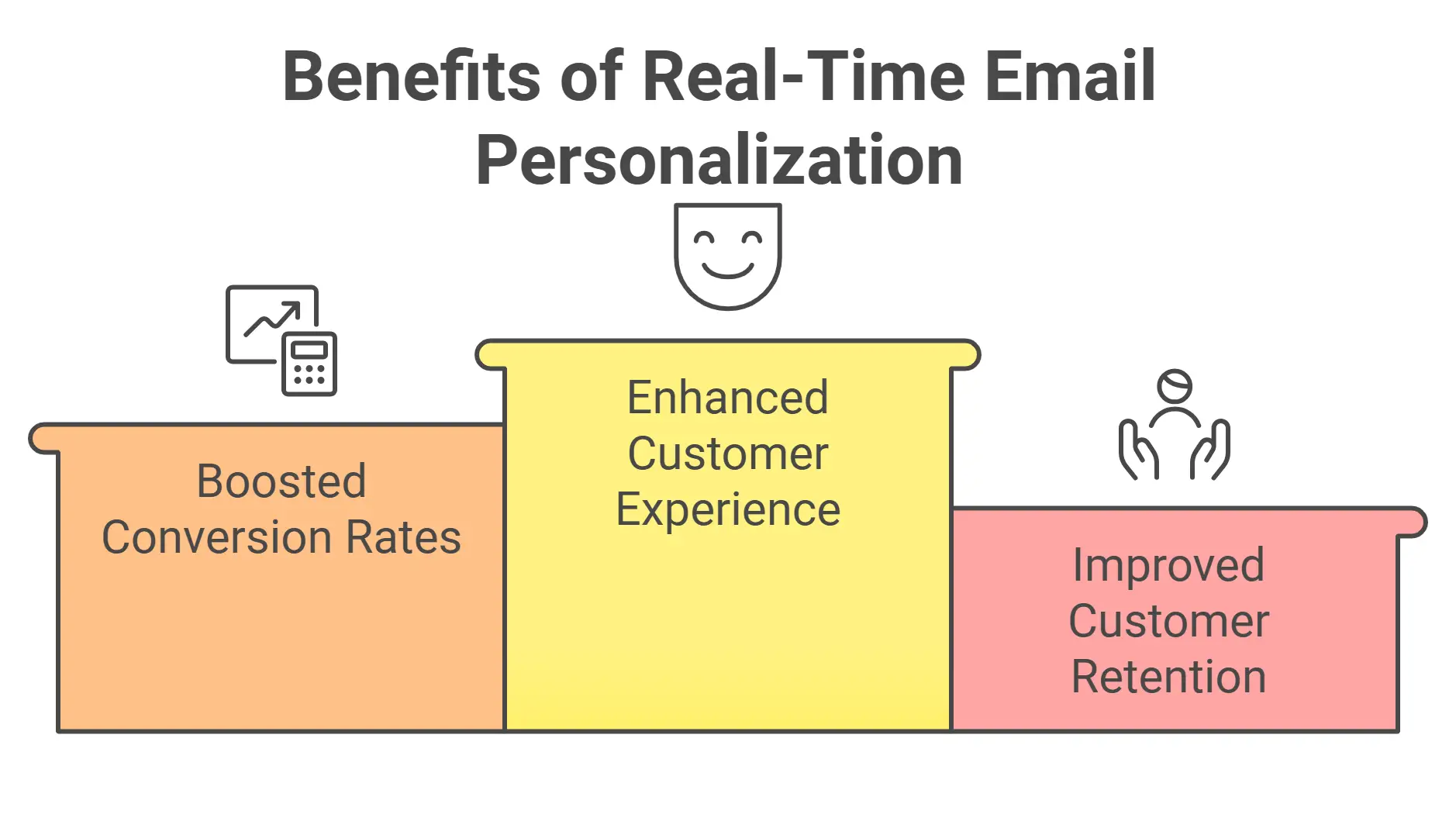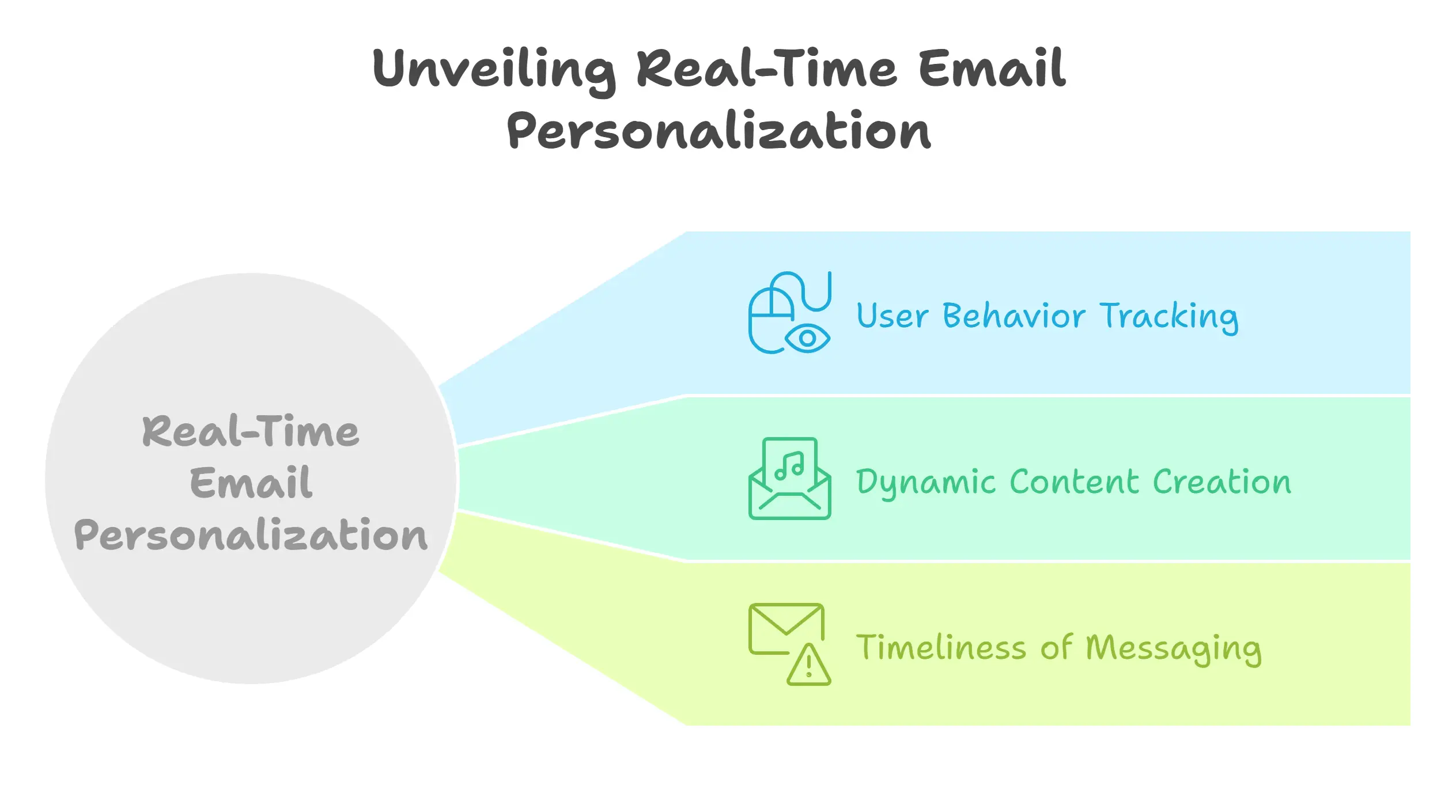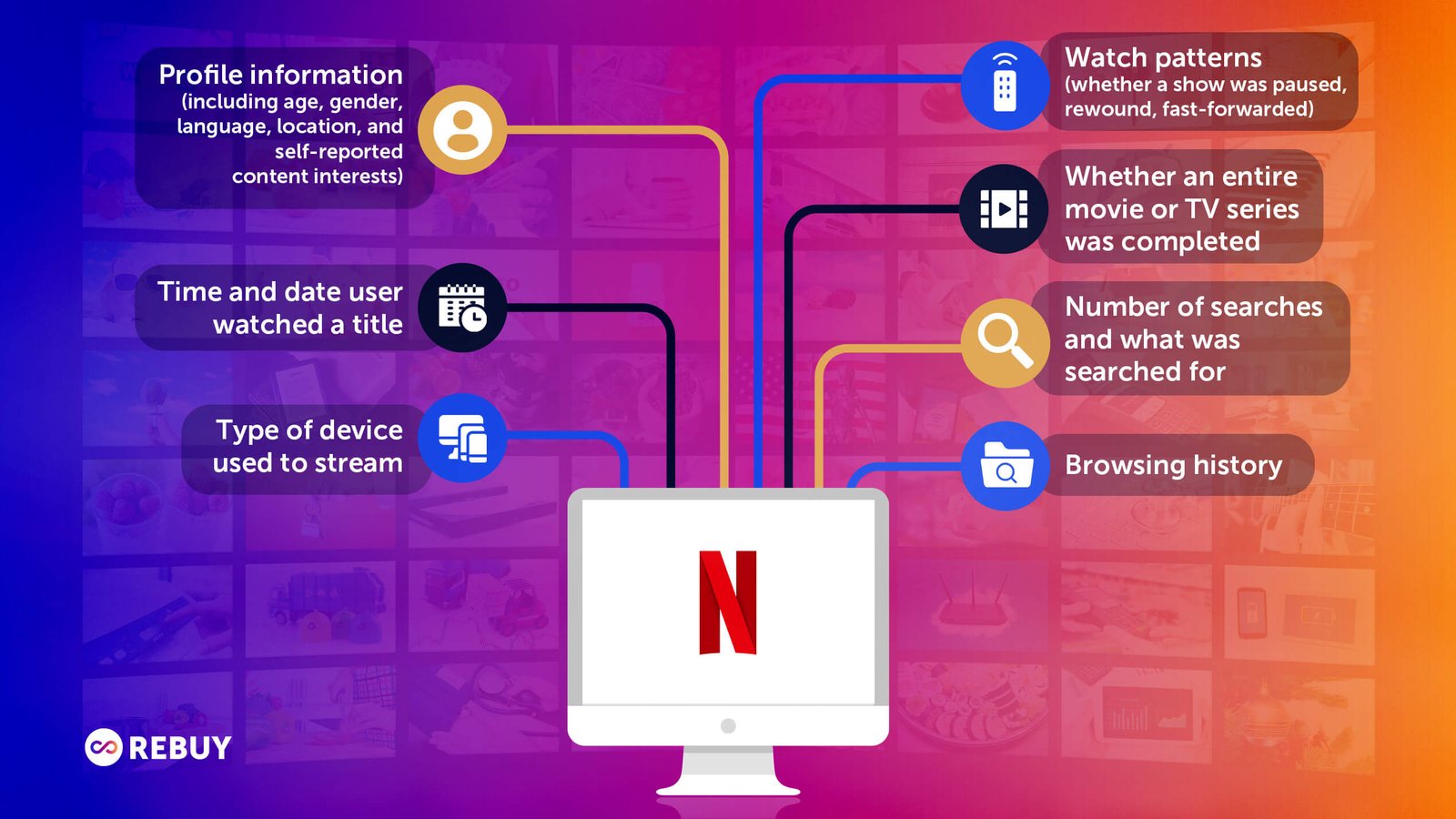Real-Time Email Personalization: Engage and Convert
In the fast-paced world of digital innovation, businesses are striving to build genuine relationships with their audience. One effective approach is real-time email personalization, which utilizes immediate data analytics to tailor email messages based on unique customer preferences and actions. This strategy significantly enhances both engagement and conversion metrics.
Diving into Real-Time Email Personalization
Real-time email personalization goes beyond just using a customer’s name; it involves creating a tailored experience based on their actions and preferences. Consumers seek relevant content that resonates with their needs and interests in the digital marketplace. To meet these expectations, businesses must focus on the details of real-time email personalization.
Defining Real-Time Email Personalization and Its Significance

Real-time email personalization signifies the art of sculpting email content in direct response to user activities or behaviors as they unfold. This approach guarantees that messages are timely, pertinent, and contextually relevant, delivering a tailored experience that resonates with the recipient.
The significance of real-time email personalization is monumental. In an era where consumers face an avalanche of generic marketing appeals, offering them bespoke content can drastically enhance their overall customer journey. Emails that resonate with a recipient’s interests not only captivate attention but also cultivate a more profound emotional bond between the consumer and the brand.
The Transformation of Email Marketing
 Email marketing has evolved significantly since its early days. Initially, brands used blanket emailing strategies, disseminating identical promotional content to whole lists without any targeted segmentation. While this method served its purpose at the time, it often resulted in lackluster engagement and soaring unsubscribe rates.
Email marketing has evolved significantly since its early days. Initially, brands used blanket emailing strategies, disseminating identical promotional content to whole lists without any targeted segmentation. While this method served its purpose at the time, it often resulted in lackluster engagement and soaring unsubscribe rates.
With advancements in technology and shifts in consumer behavior, marketers began implementing segmentation tactics informed by demographics, purchase history, and previous interactions. However, the advent of real-time data analytics has revolutionized email marketing once again. This fresh chapter empowers brands to personalize emails on the fly, adapting content according to immediate stimuli such as website visits, abandoned carts, and recent purchases.
Notable Advantages of Personalized Emails
 The perks of personalized emails extend beyond just amplifying open and click-through rates.
The perks of personalized emails extend beyond just amplifying open and click-through rates.
- Enhanced Customer Experience: Personalized emails create a delightful experience for the recipient. When their interests are reflected in the emails, customers feel appreciated and comprehended, leading to increased loyalty and trust in the brand.
- Boosted Conversion Rates: Customized emails have proven to yield higher conversion rates. By showcasing relevant offers and suggestions based on user behavior, businesses can efficiently drive sales and spur further engagement.
- Improved Customer Retention: Real-time email personalization nurtures continuous interaction with customers. By consistently providing valuable content, brands can keep customer interest alive and minimize churn rates.
How Real-Time Data Enhances Personalization
 Real-time data plays a pivotal role in the effectiveness of email personalization. By utilizing information gathered from various touchpoints, marketers can create targeted campaigns that resonate with their audience.
Real-time data plays a pivotal role in the effectiveness of email personalization. By utilizing information gathered from various touchpoints, marketers can create targeted campaigns that resonate with their audience.
- User Behavior Tracking: Real-time tracking allows businesses to monitor user behavior across different channels. This includes website activity, social media interactions, and even offline behaviors. By understanding what users are doing in real time, brands can customize their email marketing strategies accordingly.
- Dynamic Content Creation: With real-time data, marketers can create dynamic email content that changes based on the recipient’s interactions. For example, if a customer frequently browses a specific product category, emails can showcase related products, recent arrivals, or special promotions tailored to that interest.
- Timeliness of Messaging: Real-time email personalization ensures that messages are sent at opportune moments. Whether it’s a reminder about an abandoned cart or a follow-up after a purchase, timely emails can significantly impact the likelihood of engagement and conversion.Crafting messages that resonate with each individual’s unique tastes and actions can help forge genuine relationships with your audience. Platforms such as Mailchimp, GoHighLevel, and ActiveCampaign offer seamless solutions for real-time personalization, featuring options like dynamic content, segmentation, and automation.
- Mailchimp makes it easy to personalize communications with its ready-made templates and valuable audience insights.
- GoHighLevel integrates CRM functions with email marketing, enabling you to design highly tailored workflows.
- ActiveCampaign shines in sending automated personalized messages triggered by user behavior.
Curious to see these platforms in action? Check out the video below for an insightful walkthrough!
Implementing Real-Time Email Personalization Strategies
To harness the power of real-time email personalization, businesses need to implement effective strategies that leverage data and technology.
Data Collection and Integration

The foundation of successful real-time email personalization lies in robust data collection practices. Businesses must integrate data from various sources, including CRM systems, website analytics, and social media platforms. This consolidated view of customer data provides valuable insights into individual preferences and behaviors.
- Utilizing Behavioral Data: By analyzing behavioral data, businesses can identify patterns and trends that inform their email marketing strategies. For instance, understanding peak browsing times can help determine the best times to send emails for maximum engagement.
- Combining Demographic and Psychographic Data: Combining demographic information with psychographic insights allows marketers to segment their audience more effectively. By recognizing not only who their customers are but also what they value, brands can craft messages that truly resonate.
Crafting Dynamic Email Content

Once data is collected and integrated, the next step is crafting dynamic email content that reflects real-time personalization.
- Personalized Recommendations: Using algorithms, businesses can generate personalized product recommendations based on a customer’s past purchases and browsing behavior. For example, if a customer previously purchased hiking gear, subsequent emails could feature related outdoor products or accessories.
- Segmented Campaigns: By segmenting audiences based on various criteria, marketers can create tailored campaigns that speak to specific groups. This could include targeting loyal customers with exclusive offers or reaching out to inactive customers with re-engagement strategies.
Automating Personalization Processes
Automation is key to implementing real-time email personalization at scale. By automating certain processes, businesses can ensure timely and relevant communications without overwhelming their marketing teams.
- Triggered Emails: Setting up triggered emails based on user actions, such as signing up for a newsletter or abandoning a cart, allows for immediate engagement. These automated responses can provide relevant content that encourages users to take the desired action.
- A/B Testing and Optimization: Utilizing A/B testing for personalized emails helps marketers gauge what resonates best with their audience. By continuously optimizing email content based on performance metrics, brands can refine their personalization strategies over time.
Tools and Technologies for Real-Time Personalization

To successfully execute real-time email personalization, businesses must leverage various tools and technologies designed to streamline processes and enhance customer experiences.
Customer Relationship Management (CRM) Systems
CRM systems serve as the backbone for managing customer relationships and interactions. They allow businesses to store and analyze customer data, track engagement history, and segment audiences effectively.
- Centralized Data Repository: A robust CRM system provides a centralized repository for all customer data, making it easier for marketers to access insights and create personalized experiences across channels.
- Integration Capabilities: Many modern CRM solutions offer integration capabilities with other marketing tools, allowing for seamless data sharing and improved efficiency in email campaigns.
Email Marketing Platforms
Email marketing platforms play a crucial role in executing real-time email personalization strategies. These tools typically offer features such as automation, segmentation, and analytics.
- Dynamic Content Features: Look for email marketing platforms that allow for dynamic content creation. This enables businesses to customize emails based on real-time data, ensuring relevant messaging for each recipient.
- Analytics and Reporting: Robust analytics capabilities are essential for measuring the success of personalized campaigns. Marketers should choose platforms that provide insights into open rates, click-through rates, and conversion metrics to evaluate performance effectively.
Predictive Analytics Tools
Predictive analytics tools utilize historical data to forecast future behaviors and trends. By leveraging these insights, marketers can proactively anticipate customer needs and tailor email content accordingly.
- Behavioral Predictions: By analyzing past behavior, predictive analytics can help identify potential future purchases or interests. This insight enables businesses to send targeted recommendations that align with the customer’s preferences.
- Customer Lifetime Value Assessments: Understanding a customer’s lifetime value can inform personalized marketing strategies. By identifying high-value customers, businesses can allocate resources effectively and develop loyalty initiatives tailored to these individuals.
Best Practices for Effective Real-Time Email Personalization

While implementing real-time email personalization strategies is essential, adhering to best practices can significantly enhance their effectiveness.
Maintain Relevance and Context
The key to successful real-time email personalization is relevance. Emails should always provide value to the recipient, delivering content that aligns with their current interests and circumstances.
- Timing is Everything: Sending emails at the right time can make a significant difference in engagement rates. Utilize data to determine optimal sending times based on user behavior and preferences.
- Contextual Messaging: Consider the context surrounding a customer’s interaction when drafting emails. For instance, a message following a recent purchase may differ from one sent to a first-time visitor.
Test and Optimize Continuously
Continuous testing and optimization are vital components of effective email personalization. Regularly assessing the performance of personalized emails allows businesses to identify areas for improvement.
- A/B Testing Variations: Conduct A/B tests to determine which personalized elements garner the highest engagement. Experiment with subject lines, content formats, and call-to-action placements to uncover the most effective combinations.
- Feedback Loop: Encourage feedback from customers regarding their email experiences. This input can provide valuable insights into what resonates with your audience, guiding future personalization efforts.
Focus on Mobile Optimization
With the rise of mobile device usage, ensuring that personalized emails are optimized for mobile viewing is crucial.
- Responsive Design: Use responsive design techniques to ensure that emails render well across various devices. A mobile-friendly layout will enhance the user experience and improve engagement rates.
- Shortened Content: Mobile users prefer concise and easily digestible content. Tailor email copy to deliver key messages quickly while still maintaining personalization elements.
Case Studies: Success Stories in Real-Time Email Personalization
Real-time email personalization has proven successful across various industries. Examining case studies reveals how companies effectively leveraged this strategy to enhance customer engagement.
Retail Industry Examples
Retail giants have embraced real-time email personalization to drive sales and customer satisfaction.
- Targeted Promotions: One notable example is a well-known online clothing retailer that implemented personalized email campaigns based on user preferences and browsing history. By sending tailored promotions and product recommendations, they achieved a significant increase in conversion rates, resulting in a boost in overall revenue.
- Abandoned Cart Recovery: Another retail case study highlights a beauty brand that utilized triggered emails to recover abandoned shopping carts. By sending personalized reminders featuring items left in the cart, along with relevant discounts, the brand saw a rapid increase in completed purchases.
B2B Service Providers

B2B service providers have also found success with real-time email personalization.
- Lead Nurturing Campaigns: An IT services company adopted a real-time email personalization strategy to nurture leads throughout the buying journey. By sending targeted content based on lead behavior, they increased engagement and ultimately converted a higher percentage of prospects into paying clients.
- Event Follow-Ups: After hosting webinars, a SaaS company personalized follow-up emails for attendees based on their specific interests showcased during the event. This approach not only strengthened relationships but also generated additional leads.
Nonprofit Organizations

Nonprofits can benefit immensely from real-time email personalization, fostering deeper connections with donors and supporters.
- Tailored Donation Appeals: A nonprofit organization focused on animal welfare utilized real-time data to send targeted appeals for donations based on donor history and engagement levels. By personalizing messages, they experienced a significant uptick in donations during fundraising campaigns.
- Volunteer Engagement: Another nonprofit used personalized emails to engage volunteers by showcasing upcoming events aligned with their interests. This approach fostered a sense of community and encouraged greater participation.
Emerging Trends from Successful Campaigns
Analyzing success stories reveals emerging trends in real-time email personalization applicable across various sectors.
- Omni-Channel Experiences: Companies successfully integrating real-time data from multiple channels are better equipped to provide holistic customer experiences. By aligning email messaging with social media interactions and website behavior, brands can deliver cohesive and relevant content to customers.
- AI-Powered Personalization: The adoption of artificial intelligence tools for real-time personalization is on the rise. These tools enable marketers to automate data analysis, generate personalized content, and optimize campaigns in real time, reducing manual effort while enhancing results.
Final Thoughts
To wrap things up, email personalization in real-time empowers businesses to cultivate a richer connection with their audience. Utilizing live data to craft bespoke experiences enables companies to boost customer interaction, enhance conversion rates, and build enduring loyalty. As we navigate an ever-evolving digital world, adopting personalized email tactics will be crucial for brands aiming to stand out and thrive amidst fierce competition.
Looking forward, the realm of real-time email personalization brims with exciting potential. With ongoing technological advancements and shifting consumer preferences, businesses need to stay nimble and responsive, continually fine-tuning their approaches to align with the evolving demands of their customers. By harnessing the capabilities of real-time email personalization, brands can nurture significant connections with their clientele, setting the stage for consistent growth and triumph in the future.




